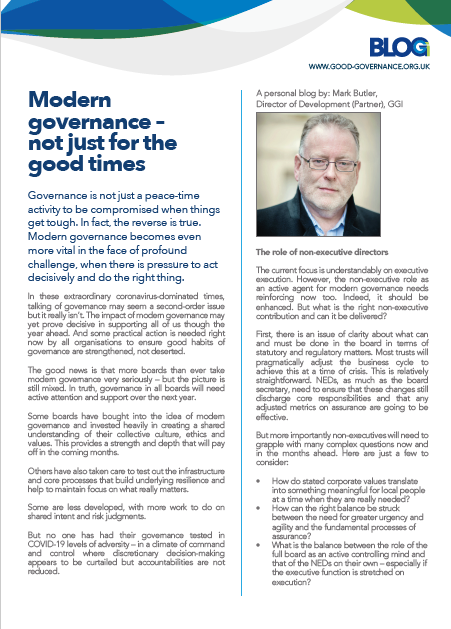Modern governance – not just for the good times
17 March 2020

Governance is not just a peace-time activity to be compromised when things get tough. In fact, the reverse is true. Modern governance becomes even more vital in the face of profound challenge, when there is pressure to act decisively and do the right thing.
In these extraordinary coronavirus-dominated times, talking of governance may seem a second-order issue but it really isn’t. The impact of modern governance may yet prove decisive in supporting all of us though the year ahead. And some practical action is needed right now by all organisations to ensure good habits of governance are strengthened, not deserted.
The good news is that more boards than ever take modern governance very seriously – but the picture is still mixed. In truth, governance in all boards will need active attention and support over the next year.
Some boards have bought into the idea of modern governance and invested heavily in creating a shared understanding of their collective culture, ethics and values. This provides a strength and depth that will pay off in the coming months.
Others have also taken care to test out the infrastructure and core processes that build underlying resilience and help to maintain focus on what really matters.
Some are less developed, with more work to do on shared intent and risk judgments.
But no one has had their governance tested in COVID-19 levels of adversity – in a climate of command and control where discretionary decision-making appears to be curtailed but accountabilities are not reduced.
The role of non-executive directors
The current focus is understandably on executive execution. However, the non-executive role as an active agent for modern governance needs reinforcing now too. Indeed, it should be enhanced. But what is the right non-executive contribution and can it be delivered?
First, there is an issue of clarity about what can and must be done in the board in terms of statutory and regulatory matters. Most trusts will pragmatically adjust the business cycle to achieve this at a time of crisis. This is relatively straightforward. NEDs, as much as the board secretary, need to ensure that these changes still discharge core responsibilities and that any adjusted metrics on assurance are going to be effective.
But more importantly non-executives will need to grapple with many complex questions now and in the months ahead. Here are just a few to consider:
- How do stated corporate values translate into something meaningful for local people at a time when they are really needed?
- How can the right balance be struck between the need for greater urgency and agility and the fundamental processes of assurance?
- What is the balance between the role of the full board as an active controlling mind and that of the NEDs on their own – especially if the executive function is stretched on execution?
- Do NEDs have a greater active role in shaping communications to stakeholders and in participation, for example, in scenario-planning on COVID-19? What are the implications of this?
Keeping the right focus on both the immediate and the longer-term is uniquely in the board’s gift. However difficult it may prove, NEDs must not be driven solely by immediate pragmatism and in the process park stewardship responsibilities as something to return to later. It is the role of NEDs to make sure this doesn’t happen.
Priority actions
There are some practical problems here which are not just about focus and mindset. Many people serving on boards are juggling multiple responsibilities. Time and focus may be spread too thinly to fulfil responsibilities as they have been. Boards tend to meet physically and are not well rehearsed in doing virtual business effectively. Proper preparation of papers offering clarity about what is being asked of the board requires increased time when time is in short supply. This all needs attention now.
Assurance on complaints, freedom of information, and serious incidents do not go away and ironically might need additional capacity to ensure the right level of assurance is maintained at a time of crisis.
Practical Solutions
We can already see different levels of maturity of governance and response playing out across the public sector. GGI’s National Commission on the future of governance in the public sector is looking to capture the deeper learning about governance over the next year.
On an immediate, practical level GGI is offering its skills, which are deep, relevant and practical, as part of the collective national effort to do the right things now.
We are always here for advice but we would prefer to provide support in whatever form might be needed to help maintain critical institutions and services.
We are all in this together.
Mark Butler
Director of Development (Partner)
GGI


